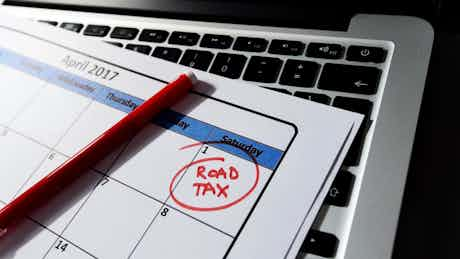How much tax will you pay on a new car purchase?
July 02, 2025 by Siobhan Doyle

For as long as people have owned cars, there has been car tax. This handy guide breaks down what tax you’ll have to pay when you buy your new car.
There are plenty of cost implications when owning a car, one of them being tax. It may slip to the back of your mind in all the excitement of buying your fresh set of wheels, but it’s certainly worth pausing for a moment to consider how much tax you’ll have to pay.
It depends on a lot of different factors, and just as you’ve got your head around it the requirements change. Car tax rates were adjusted during the 2024 Autumn Budget, so this handy guide will summarise all the fees you’ll be faced with.
Remember, you can buy a brand new or used car right here on Carwow. And you can also sell your car, too. We’re here to help you through every step of your car-changing journey.
How much tax do I pay when I buy a new car?
The tax on your new car is best explained by splitting it up into three components: VAT, first-year VED and VED after the first year.
New car VAT
All new cars sold will have VAT added which is charged at the standard 20% rate. This will be included in the price you see, unless it’s a business purchase in which case it may be listed separately. This is because businesses can claim back some or all of the VAT depending on how the vehicle is used. For example, company vehicles used for both business and personal use may be eligible for a 50% VAT refund.
First year VED
Vehicle Excise Duty (VED) is a tax levied on cars using the roads in the UK. These funds used to be specifically allocated to maintaining the roads, but it now forms part of the general tax pool.
There are varying VED charges and regulations based on when the vehicle was first registered. In the case of a new car, the rules introduced since 1 April 2017 are the ones that apply.
These state that every new car registered is liable for a one off tax payment based on its CO2 emissions. These figures are periodically updated to account for new technologies and taxation requirements.
VED after the first year
The VED tax from the second year onwards is simplified into a flat fee across petrol, diesel, hybrid and electric cars. Drivers of cars that cost over £40,000 will also have to pay an additional annual charge from the second to the sixth year of the car’s life.
Current first year VED rates
During the 2024 Autumn Budget, it was announced that the first year car tax is changing from April 2025. The biggest news here is that electric cars are no longer exempt – you will be charged £10 in the first year.
Here are the current car tax rates, which apply to cars first registered on or after 1 April 2017:
| CO2 emissions (g/km) | First-year cost |
|---|---|
| 0 | £10 |
| 1-50 | £110 |
| 51-75 | £130 |
| 76-90 | £270 |
| 91-100 | £350 |
| 101-110 | £390 |
| 111-130 | £440 |
| 131-150 | £540 |
| 151-170 | £1,360 |
| 171-190 | £2,190 |
| 191-225 | £3,300 |
| 226-255 | £4,680 |
| >255 | £5,490 |
If you are unsure what band your car fits in, you can use the Vehicle Certification Agency (VCA) tax checker tool.
VED rates after the first year
The rates for the second year tax payment and thereafter are now £195 for all car types. There’s also an additional £425 annual charge for cars that cost over £40,000 that you have to pay during years two and six.
Aside from the tax component, you may have to pay other fees and charges when buying a new car. The total cost to have your car ready to drive is sometimes known as the On The Road price (OTR). This is the car’s price including VAT, delivery fees, registration and the first year’s road tax as detailed above. The good news is that every offer you receive from Carwow already includes these costs.
Car change? Carwow!
Looking for a new set of wheels? With Carwow you can sell your car quickly and for a fair price – as well as find great offers on your next one. Whether you’re looking to buy a car brand new, are after something used or you want to explore car leasing options, Carwow is your one stop shop for new car deals.
Click here to follow us on WhatsApp, where you can keep up-to-date with all the latest news, reviews, advice guides and videos.















